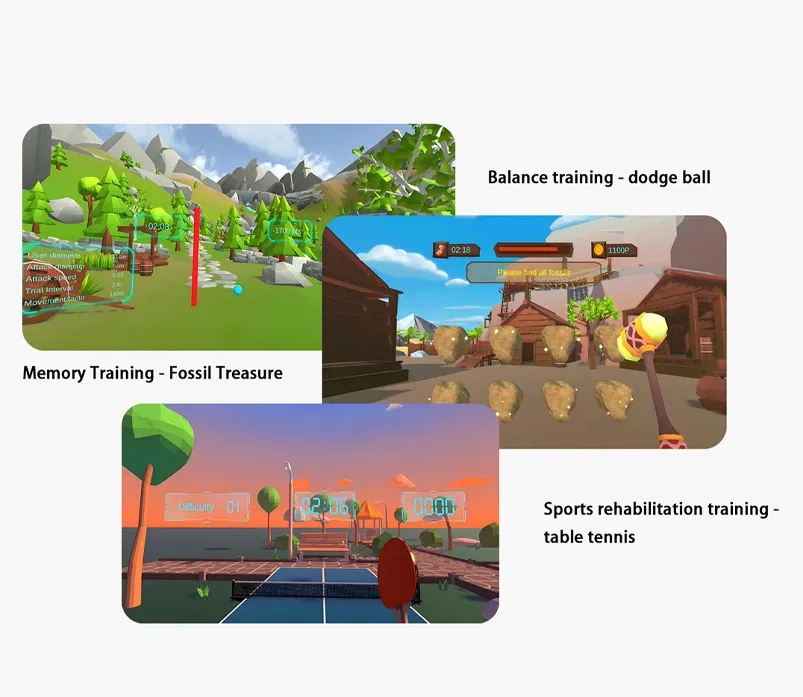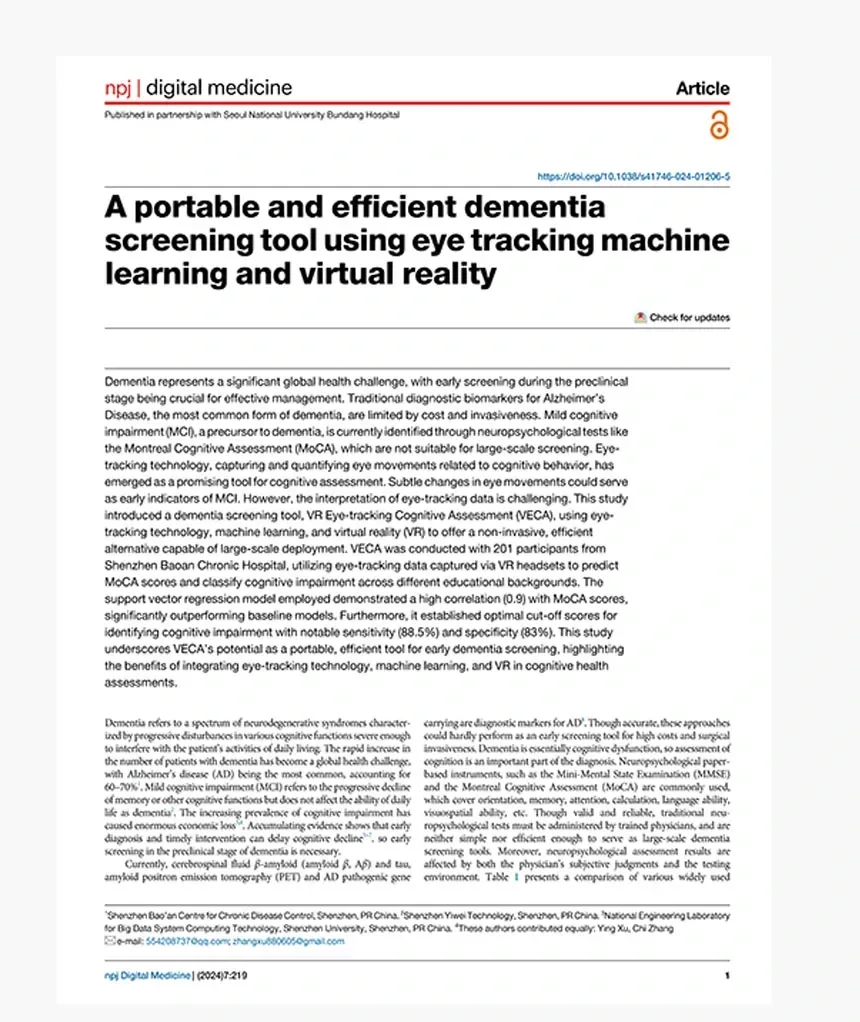
Advancing inquiries suggests that computer-generated reality therapy can markedly elevate the health of participants managing dementia. By transporting them to peaceful environments, VR presents a novel platform for mental activation, psychological balance, and interpersonal communication. Several research works have demonstrated that VR therapy can minimize excitability, concern, and sadness in dementia patients while also raising their retention, focus, and communication skills.
- VR permits individuals with dementia to recollect valued experiences through interactive reenactments.
- Additionally, it can allocate a protected and facilitative space for socialization, fostering a impression of association and acceptance.
- Scholars think that VR therapy has the chance to reinvent dementia management by presenting new and innovative means to manage the elaborate obstacles faced by people experiencing this condition.
Electronic Health Solutions for Mental Boosting in Alzheimer's
Progressive technological approaches are exhibiting benefits in the sector of mind sharpening for participants living with Alzheimer syndrome. These platforms utilize technical resources to improve brain function and hypothetically curtail the evolution of the malady. Playful drills, personalized evaluation, and brain-computer training are some illustrations of methods being researched in this expanding territory. While studies are proceeding, digital therapeutics offer a substitute route for improving the conditions of those struggling with Alzheimer's ailment.Virtual Scenario Navigation in Alzheimer's Treatment
Touching users combating Alzheimer health issue, the ongoing deterioration of memory and thinking skills can significantly reduce their aptitude to interact with the nearby context. This damaging syndrome often results in withdrawal, upset, and a weakened self-perception. Newest developments in virtual reality technology deliver a pioneering opportunity to mitigate these issues by building immersive scenarios that can ignite the brain and refresh cognitive function.
Digital immersive sceneries configured specifically for those with Alzheimer's can engulf them in comforting surroundings, such as their old family house or a popular natural site, stirring positive memories and decreasing anxiety. Through interactive exercises, these virtual environments can also boost cognitive abilities like mind retention, vigilance, and problem-solving.
The likely improvements of virtual reality in Alzheimer's support are great. Early examinations have confirmed promising results, with individuals reporting improvements in cognitive faculty, mood, and overall quality of life. As this technique continues, it holds the key to modifying the way we approach Alzheimer's disease, presenting a new pathway for assistance and strengthening.
Virtual Memory Therapy for Alzheimer's Clients
Reminiscence therapy is an acknowledged technique used to augment cognitive function and quality of life in individuals with Alzheimer's disease. This classic form of therapy involves eliciting patients to retrieve past experiences, often through talks. However, a revolutionary approach is emerging: VR-mediated reminiscence therapy.
This immersive technique utilizes virtual reality headsets to relocate patients in accurate environments that trigger memories from their past. By going through these simulated settings, individuals with Alzheimer's can relate with their past in a significant way.
Can VR Help Fight Dementia? Exploring the Impact on Memory and Cognitive Function
Virtual reality (VR) is emerging as a aspiring mechanism in the fight against dementia, affording trailblazing ways to stimulate memory and cognition. By generating immersive experiences, VR can support individuals with dementia remember memories, interact in meaningful activities, and boost cognitive skills. Studies have indicated that VR interventions can result in serious improvements in memory recall, attention, and positional awareness. Moreover, VR provides a reliable and motivating space for individuals with dementia to express, reducing feelings of isolation and fear.
- In addition, VR can be adjusted to individual needs and preferences, granting increased levels of interaction.
- Notwithstanding the opportunities of VR, continued research is needed to fully understand its long-term effectiveness in dementia care.
Recovering Recall and Connections: Virtual Reality's Social Benefits in Alzheimer's
Immersive reality is emerging as a cutting-edge platform in the area of neural degeneration. By generating compelling and mutual scenarios, VR has the possibility to encourage memories, foster social interaction, and augment the overall quality of life for patients experiencing Alzheimer's. Among the most notable aspects of VR is its ability to convey users to beloved areas and encounters from their past. Whether it's a walk through a childhood home or a simulation of a beloved holiday, these virtual experiences can invoke happy memories and improve cognitive operation. Furthermore, VR can encourage social interaction by engaging individuals with others who share similar traits. This can be particularly beneficial for people with Alzheimer's who may face difficulties with traditional social contact. By delivering a safe and absorbing virtual space, VR can diminish feelings of isolation and loneliness, which are common among subjects coping with Alzheimer's. Overall, VR holds immense capability for revolutionizing the lives of people with Alzheimer's by resurrecting memories, fortifying connections, and enhancing their quality of life. As technology advances to grow, we can expect even more revolutionary applications of VR Cognitive Rehabilitation in the field of dementia care.Enhancing Cognitive Training: Implementing VR Techniques for Alzheimer's Aid
Augmented reality experiences is rapidly emerging as a breakthrough tool in the realm of cognitive training, particularly for people experiencing Alzheimer's disease. By immersing patients in interactive and engaging virtual environments, VR-based interventions can advance cognitive functions such as memory, attention, and problem-solving. These games habitually incorporate elements of storytelling, exploration, and social interaction, making the training process increasingly entertaining. Studies have shown that VR-based cognitive training can lead to significant improvements in cognitive performance, theoretically delaying the progression of Alzheimer's symptoms. Moreover, VR provides a safe and controlled environment for patients to practice new skills and strengthen their confidence.
- Game-enhanced procedures in VR training can make it exceptionally compelling and amusing for clients with brain function issues.
- VR simulations can offer accurate scenarios that provoke and motivate cognitive functions.
- Personalized VR experiences can cater to individualized wishes and procedures.
Virtual Reality: New Horizons in Dementia Assistance
Engaging digital environments offer a new and advantageous avenue for individuals living with dementia. These technologies can recreate familiar environments, allowing those affected by cognitive decline to relive cherished memories and foster a sense of comfort. By addressing the challenges of dementia, VR contexts have the ability to refine quality of life for both patients and their families.
- Research indicate that VR methods can effectively impact cognitive function, affective well-being, and even sensory abilities in individuals with dementia.
- Moreover, VR provides a safe and organized environment for investigation, reducing the risk of anxiety.
- Furthermore, VR can boost social bonds by allowing individuals with dementia to connect in augmented activities with others.
Innovative VR for Alzheimer's Early Recognition and Therapy
neurodegenerative Alzheimer's type manifests a difficult problem, often persisting unseen in its early stages. Nevertheless, virtual reality (VR) is materializing as a transformative tool for initial identification. Through immersive simulations, VR can measure cognitive faculty in ways that traditional methods fail to. This power allows for fast support strategies, potentially delaying disease progression and increasing the quality of life for users with Alzheimer's.
- VR cognitive tests measure recall, alertness, and positional skills in safe and regulated spaces.
- Individualized VR environments encourage client participation in brain-boosting activities.
- Interactive virtual contexts enable socialization and interaction for Alzheimer's patients.
Closing the Divide: VR for Communicative and Interactive Dementia Support
{In the realm of dementia care, innovative technologies are emerging to supplement the lives of persons with neurodegenerative disorders. Virtual reality (VR) is one such resource that holds immense capability for fostering communication and interaction improvements in dementia via VR. By creating immersive and engaging virtual environments, VR can energize cognitive function, reduce behavioral issues, and ultimately improve the overall well-being of clients affected by dementia.
VR experiences adapted to dementia patient needs can range from reminiscence therapy sessions that fade patients back into earlier life scenes, to interactive games that promote social interaction and cognitive challenge. Furthermore, VR has the ability to connect persons managing dementia with social groups, regardless of physical limitations, fostering a sense of solidarity.
- VR can assist in reducing agitation and anxiety by providing a calming and enthralling environment.
- Research have shown that VR interventions can lead to improvements in cognitive function, mood, and social interaction in users diagnosed with dementia.
- As technology evolves in advance, we can expect even more innovative and helpful
